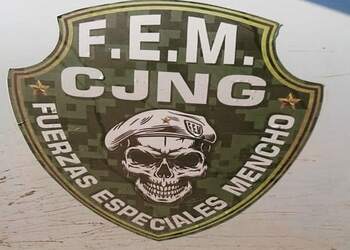With the arrest of a top cartel leader’s brother, Mexican authorities are again resorting to an often ineffective strategy of targeting family members to weaken major drug trafficking organizations.
The Mexican military arrested Abraham Oseguera on April 22 in Autlán de Navarro, Jalisco, on suspicion of money laundering and drug trafficking, according to Mexico’s Defense Ministry (Secretaría de la Defensa Nacional – SEDENA). Oseguera is the brother of Nemesio Oseguera Cervantes, alias “El Mencho,” the leader of the Jalisco Cartel New Generation (Cártel Jalisco Nueva Generación – CJNG) and one of the United States’ most-wanted criminals.
In the days following his arrest, the Attorney General’s Office said that Oseguera is being charged with drug trafficking offenses and weapons possession.
It’s not the first time he has been taken into custody. US records show he served time in California in the mid-1990s for trafficking heroin before being released and deported back to Mexico.
And he is not the first of El Mencho’s siblings to be arrested. Another brother, Antonio Oseguera, alias “El Tony Montana,” was arrested in Guadalajara in December 2022 on money laundering and other charges relating to the CJNG’s drug trafficking activities and has since been charged in the United States. He too had already done time in the US on drug charges dating back to the late 1990s.
Other family members in custody include El Mencho’s son, Rubén Oseguera González, alias “El Menchito.” Oseguera González was designated as a top CJNG leader and was first captured in a large-scale military operation in Guadalajara in January 2014. He was released before being recaptured in July of that year and six years later was extradited to the US.
SEE ALSO: Chiapas Bleeds as CJNG, Sinaloa Cartel Fight for Guatemala Trafficking Routes
El Mencho’s daughter, Jessica Oseguera González, was arrested in the US in February 2020 when she came to see her brother’s court appearance. She was released from custody in April 2022.
El Mencho’s wife, Rosalinda González Valencia, was arrested in Mexico on money laundering charges in November 2021. González Valencia was a major player in the drug trade before meeting El Mencho, according to VICE News. She was sentenced to five years in prison at the end of last year, but her case may now be coming apart, prompting speculation that she could be released.
In all, close to a half-dozen of El Mencho’s close relatives are in custody.
InSight Crime Analysis
Abraham Oseguera’s detention – the latest to impact El Mencho’s immediate family circle – appears to be part of a popular, but often ineffective, strategy employed by governments seeking to derail large, clan-based drug trafficking organizations by reeling in relatives of those at the top.
There is little evidence to suggest that decapitating organizations in this manner significantly impacts their operations as a whole. It also runs counter to negotiations in which law enforcement officials offer to exclude relatives of drug traffickers from potential prosecution in exchange for their cooperation in criminal investigations.
Aside from El Mencho’s family, Mexican and US authorities have also hounded relatives of the Sinaloa Cartel’s notorious leader, Joaquín Guzmán Loera, alias “El Chapo,” following the drug lord’s conviction and life sentencing in 2019.
That pursuit has included the incarceration of Sinaloa Cartel operator and Guzmán’s wife, Emma Coronel, who pled guilty to drug trafficking charges in the US in June 2021.
Authorities are also going hard after El Chapo’s four sons, known collectively as Los Chapitos, who inherited an important faction of the Sinaloa Cartel following their father’s downfall. One of the sons, Ovidio Guzmán, was captured at the beginning of last year and promptly extradited to the US.
SEE ALSO: After Arrests, Extraditions, and Infighting, What Does the Future Hold for Mexico’s Chapitos?
But even though the extradition of El Chapo, and the subsequent hunt and arrest of one of his sons, did cause violence to ricochet around the state, there has been little long-term impact on the Sinaloa Cartel as a whole. It remains one of the most powerful criminal networks in the world, according to the United States Government.
Likewise, the recent arrest of El Mencho’s brother is unlikely to dent the CJNG’s rapid expansion throughout Mexico, which has a presence in nearly every Mexican state. Combined, the Sinaloa Cartel and CJNG dominate the transport of cocaine and synthetic drugs to the US consumption market.
Although often family-based operations, modern drug trafficking organizations are also now structured more like franchises than corporations and are well-placed to absorb the kinds of leadership challenges prompted by the arrest of close relatives. Many of their cells operate relatively locally and independently of each other, which cushions them from the loss of top leaders and also aids territorial expansion.
In the case of the latest Oseguera detention, Alberto Islas, security analyst and founder of consultancy firm Global Leading Solutions said it signifies a hard, but momentary local blow to the CJNG, and will force them to rearrange their agreements there.
“It hinders the organization, temporarily, and hits them financially. But the effect is temporary and they recuperate or find another way,” Islas told InSight Crime
Governments around the region have largely failed to vary their approach to anti-narcotics even when confronted with a lack of tangible results.
In Colombia, for example, the Gaitanist Self-Defense Forces (Autodefensas Gaitainists de Colombia – AGC) remains one of Colombia’s strongest criminal groups despite authorities’ attempts to capture relatives of clan leader Dairo Antonio Úsuga, alias “Otoniel.” From around 2015 onwards, Colombian and US authorities went after Otoniel and his family members including his sister and his cousin, before finally taking down Otoniel himself.
Featured image: Emblem used by El Mencho’s Special Forces, a branch of the CJNG. Credit: InSight Crime

